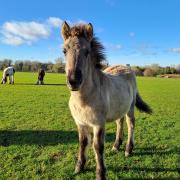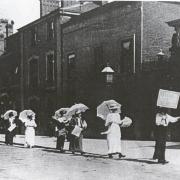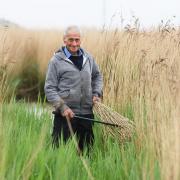Keeping an eye on the beach and the sea stretching out before them, the National Coastwatch Institution (NCI) plays an essential role in helping our coastline remain a safe place.
There are 49 branches of the NCI nationwide – including five in Norfolk, at Caister, Wells, East Runton, Mundesley and Gorleston – with a team of dedicated volunteers from each area manning the stations every day, watching for vessels or swimmers in trouble in the water, problems on the land or any suspicious activities.
Based at the former lifeboat station, Caister NCI launched in 2011 and station manager Mike Cooke says the work of the volunteers has become integral to the way in which the coastline is monitored.
“In the beginning there were six of us at Caister and we only opened on Saturdays and Sundays. Now we operate seven days a week, all year, during daylight hours, and we have around 30 members who share out the shifts.”
The organisation works closely with the coastguard, police and ambulance service to alert them to any emergency situations and assist them where necessary.
“We are certified as having Declared Facility Status, which means we are an integral part of the National Search and Rescue Structure, and we work very closely with the Maritime Coastguard Agency. At the start of every day we log in with the nearest coastguard, they usually ask for a quick report on weather, conditions or any other news and then we do the same when we finish at the end of the day as well,” he says.
“If we have an incident, whether on the beach or out at sea, we dial 999 and liaise with the coastguard, giving them information, sharing grid references if it is on land, or longitude and latitude if it is out to sea. It is the same with all the emergency services.”
The NCI was set up in 1994 after two fishermen lost their lives off the Cornish coast below a recently closed coastguard lookout. Following the accident, people there decided to restore a visual watch at the site and the first station was opened at Bass Point on the Lizard. Run entirely as a voluntary organisation, the NCI began to spread, maintaining a presence all around the British coast to plug gaps in coastal surveillance where no coastguards are present. Today it has more than 2000 volunteers.
As well as keeping their eyes on what is happening within the sight range of their stations, volunteers also monitor radio channels and providing a “listening watch” in poor visibility. They are also trained to deal with emergencies and in first aid, including at Caister how to use the on-site defibrillator.
“Our role and what we are watching out for is very varied, but it often involves smaller vessels who don’t have such sophisticated technology on board. As a beach popular with holidaymakers, we also see a lot of problems with the ever present inflatable dinghies. Last year a woman stood on a metal spike as she came out of the sea following a swim, so needed medical attention,” he says.
“On another occasion a man was kayaking out to the Scroby Sands wind farm, and we called it in to the lifeboat as the conditions became very rough. When the crew got to him he insisted he was fine and sent them back, but an hour later he called for help himself using his mobile as he suddenly found himself in difficulties. It is essential to keep a watchful eye on both those on the water and the changing conditions.”
Each NCI station is autonomous but they work together when needed, and Caister is unique in that it is situated alongside the Caister Volunteer Lifeboat Service – who suggested the establishment of the NCI at the site.
“We work very closely with the lifeboat crew and they like to class us as part of their family, which is great. We do regular training exercises together which is also really good for us and for them.”
Mike, who combines his shifts with working as a gardener, says the volunteers are incredibly committed to the organisation and as well as those who work at the station, there is a team of fundraisers behind the scenes.
“A lot of us still work as well as volunteer, but I think we all do it because we really believe in it and enjoy it.”
Find out how to volunteer at www.nci.org.uk.



























